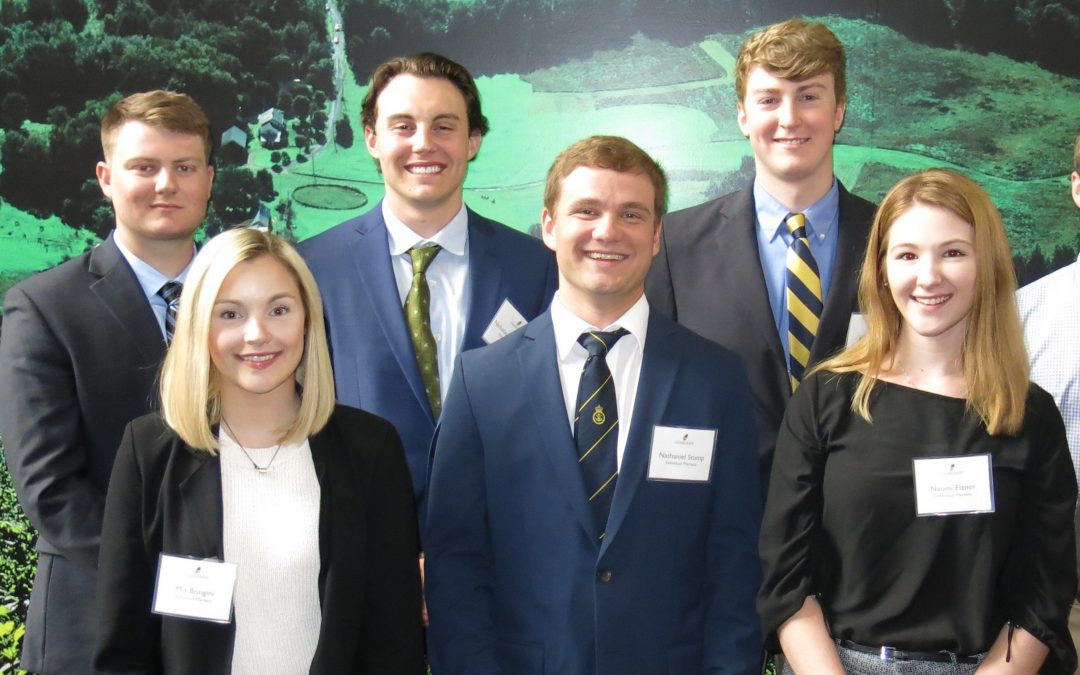
by Madison McHugh | Mar 22, 2019 | Internship Experiences, Undergraduate Students
My name is Austin O’Neill, and I am a senior double-majoring in International Relations and Economics with a minor in Arabic. I completed an internship at Guardian Life Insurance Company of America this semester in addition to my previous full-time internship last summer. My position is in Disability Insurance individual markets under the Product Strategy team.
I originally chose to intern at Guardian Life because they have a large presence in my hometown of Pittsfield, MA, offering a great opportunity very close to home over the summer. I continued to intern with Guardian Life when the Product Strategy team asked me to stay on during the school year to assist with a variety of projects, which indicated that I am considered a valued member of the team.
The department focuses on many different areas of disability insurance products, including research and development, competitive research, product training, filing, and support. I had the chance to assist across every responsibility, providing me with a broad spectrum of learning opportunities. My main responsibilities were preparing files for state insurance agencies, altering documents and content with the rebranding team, and creating PowerPoints and spreadsheets for presentations by the executive team.
One interesting project I completed was designing the PowerPoint for a new product pitch presented by the executive team. The product was considered revolutionary for the market, and I was tasked to express the characteristics of the product. This project was exciting as it had real implications for the highest-ranking officers of Disability, and it allowed me to showcase skills I have learned at the internship and through classes at Seton Hall.
I found a great balance in building skills between my internship and course studies. I became very familiar with Excel, which is a skill I have utilized at school with assignments such as my senior thesis, as well as data collection for the Product Strategy team. While working on product filing assignments for Guardian Life, I received exposure to Adobe Pro, which is important for many different business operations, but was also applicable as a document editing tool for my studies. Additionally, it was interesting to work on the front-end and back-end of rebranding for a large company. I edited and updated documents, and I tested webpages and programming software for consumer friendliness. The skills I learned from these duties are numerous and will help me in my future career.
My internship at Guardian Life helped me develop in both my professional and academic life. I networked across all business areas and may seek full-time opportunities at Guardian Life after graduation. Even as a Fortune 250 company, Guardian Life still seeks to receive input from all its employees, from interns to executive teams. For these reasons, I would suggest others to seek internships at Guardian Life for learning and development in the private sector.
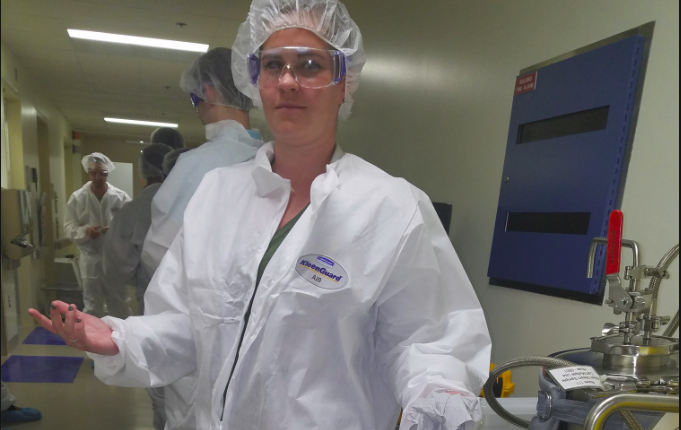
by Madison McHugh | Dec 5, 2018 | Graduate Students, Internship Experiences
My name is Amy Marks, and I am pursing a dual degree in the MBA/MA program with a specialization in Supply Chain Management. I was a Data Scientist Intern at Pfizer primarily responsible for improving the Supply Chain of pharmaceuticals through predictive analytics and machine learning algorithm improvement. During my time with Pfizer, I worked on a specific project in text mining through Latent Dirichlet Allocation and Natural Language Processing – in other words, I built models based on data in text format rather than numeric. In addition, I was responsible for building an interactive dashboard so that departments could interact with my findings independently based on their needs. My work allowed my team to quickly identify trends, patterns and areas in need of improvement and then communicate the results to the respective departments.
My internship directly supported my goal of improving access to medicine and vaccines in developing countries. Among its many global initiatives, Pfizer has a pledge to the Developing World under the Advance Market Commitment. Under the Gavi Vaccine Alliance, Pfizer has pledged to supply up to 740 million vaccinations to infants and young children in Gavi-eligible countries through 2025. This is only possible through sound supply chains, which are improved through data analytics.
My coursework equipped me with the basic skills and knowledge, but application in the real-life professional world can be challenging. Pfizer is an extremely fast paced, forward-thinking company; to keep up with everything going on around me was a big difficulty. However, I met the challenge by completing diligent research on topics before meetings, learning the big picture of specific projects, and, most importantly, identifying and improving on my personal strengths that could propel the company forward.
The most rewarding part of my internship was gaining exposure to a variety of business operations. I had the opportunity to tour research, manufacturing and quality assurance labs throughout the company’s various locations. I attended weekly learning sessions that provided information on the ongoing projects outside my field of study. I also attended multiple events that provided a variety of networking opportunities, including volunteering at a local park, meeting after-hours for team bonding, and attending various workshops. Furthermore, I was included on daily conference calls and meetings, which were extremely beneficial in experiencing how global operations are managed in a business setting.
My biggest takeaway from this experience was the importance of getting involved, taking initiative, and identifying the strengths that you can offer. It is much easier to remain in your comfort zone or to quickly be overwhelmed by the jobs’ expectations, or by all of the activity going on around you. However, every person working on a project contributes in one way or another, and it is imperative to be self-aware of what you have to offer, what you can learn and how you can apply it. This allows you to not only gain skills, but to increase your own confidence, network with professionals, and highlight your value as a potential future employee.
I recommend this internship for students interested in business as well as the unique position of pharmaceuticals to improve the world through the direct production and development of sustainable medicines and vaccinations. It was a truly unique experience.
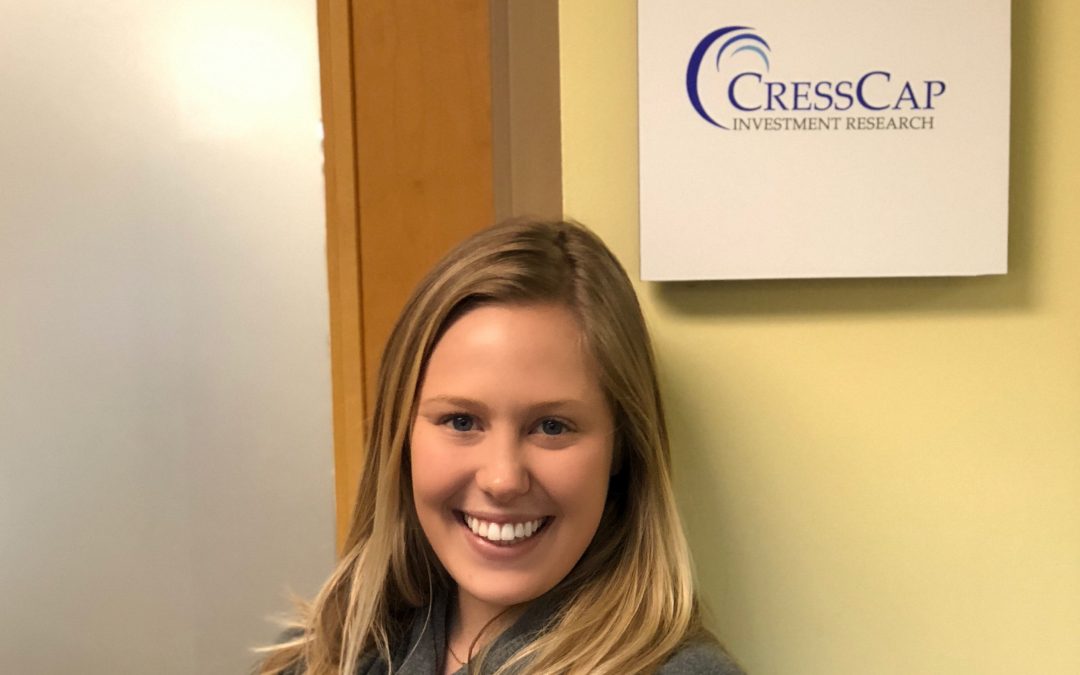
by Madison McHugh | Apr 5, 2018 | Internship Experiences, Undergraduate Students
My name is Tela Wittig, and I am a junior Diplomacy and International Relations student. I have taken a convoluted path to my current internship and career field, changing my focus from international criminal law and law enforcement to international business. It was through this journey that I came to intern at CressCap Investment Research.
CressCap is a small, innovative company that has essentially automated many of the functions of a financial analyst through fractal analyses of stocks’ fundamentals. Although investment research is considered far removed from the international relations education I received, my assignments have been shockingly compatible with my skillset. I recall coming into the office for my second interview as well as my first opportunity to meet with the whole team. They asked me several questions about how I had found out about the internship and why I had decided to follow through with the application. Through these questions, it was clear that they were beating around the point that I had no finance, sales, or programming experience – the skills most natural to FinTech startups.
My final interview was with the COO who asked me outright why I wanted to work at CressCap and what I wanted out of this experience. I answered without hesitation that I had made a commitment to moving into the private sector and I intended to learn. Then we went through the CressCap website, and I explained the grammar and style changes I thought would improve their external image. I suppose it’s just lucky that I walked into a group of people who are invested enough in their business that they appreciate that kind of criticism from an interviewee, but the chance I took paid off. Since then, I have found the office to be a great place for expressing myself and feeling heard.
Today, I am three months into my first experience in finance. My passion for the finance industry has grown, and my new knowledge has helped me identify and express what I want to do in my professional career. I am working hard to learn all that I can about running a business, including sitting in on meetings, asking questions, and working within our systems. Moreover, while learning new skills, I have also come to realize that there are many aspects of my international relations education that I can maintain as I move farther into my finance career.
In the finance sector, it turns out that reading, writing, and language skills are key. This has worked to my advantage in many ways. My education in Diplomacy and International Relations helped me improve my writing and analytical skills. In addition, I worked as an English writing and grammar tutor on the Seton Hall campus. These experiences helped me realize my love for the English language and further advance and improve my Chinese language education. I know now that I can pursue each of these subjects in conjunction with finance and make myself indispensable by possessing coveted language skills and expertise. As a result, I was chosen to work with CressCap’s CEO to write weekly contributor articles for Forbes.com with top and bottom international stock picks using our platform’s analysis. In this way, CressCap has been an exceptional experience because it has allowed me to tailor my unique skillset to the tasks at hand. This has brought all of my passions together to create something I really love to do, which is an exceptional opportunity at 20 years old. I highly recommend the internship for students who want to learn about finance from the ground-up and increase their marketability in the private sector.

by Madison McHugh | Nov 29, 2017 | Graduate Students, Internship Experiences
My name is Marissa Hutton, and I am currently a second year graduate student completing a dual degree in Diplomacy and International Relations and Strategic Communication. During the summer of 2017, I interned at an international communications firm, BLJ Worldwide in New York City. Daily responsibilities varied, but over the course of a week, I would typically produce memos on a variety of topics, create and manage databases of contacts and edit different pieces of writing.
The great thing about BLJ is that it was rare for interns to be tied down to a single project all day. The firm’s numerous clients meant that interns completed multiple tasks in a day and utilized different skill sets to assist the account managers. Even the smallest task of gathering contact information could become a springboard for an account manager to set up vital meetings for clients that could have long-term effects on their business. That was one of my favorite parts of being in the office: no job was too small and everyone appreciated the work done for them.
In terms of diplomacy, my internship required that I write, analyze, and conduct research on multiple current events each day. Our work tended to focus on diplomatic hot spots and areas that are sources of much discussion and analysis for a diplomacy student. Each day, interns ventured into Google News to pull any media mentions in order to create a report that illustrated the “public mood” in a 24-hour period. Due to international events at the time, some clients received an extensive amount of coverage, which then required me to conduct research on the media outlets and institutions discussing them, a process that exposed me to important influencers in the media and academia.
I also found that a large number of the case studies I was asked to analyze in my courses help me complete tasks in my internship. In my communications courses, these studies gave me a bank of examples to look back upon and draw new conclusions from, whereas in my diplomacy courses, the case studies provided me with important background information and policy analyses that I drew upon in writing memos for clients on diplomatic matters and institutions.
In terms of my career choice, this internship provided me with an answer to that ever-looming question: is this really what I want to do with my life? Thankfully, that answer was a resounding yes. My elders always said that if you are able to find enjoyment in all aspects of your career, then you never truly ‘work’ a day in your life. That is what I discovered about myself through my work at BLJ. I sincerely enjoyed everything from media monitoring to editing to the endless amounts of reading required to stay on top of the game. While my past internship experiences provided me with professional skills and knowledge, this one gave me much more: experiential confirmation that I made the right choice.
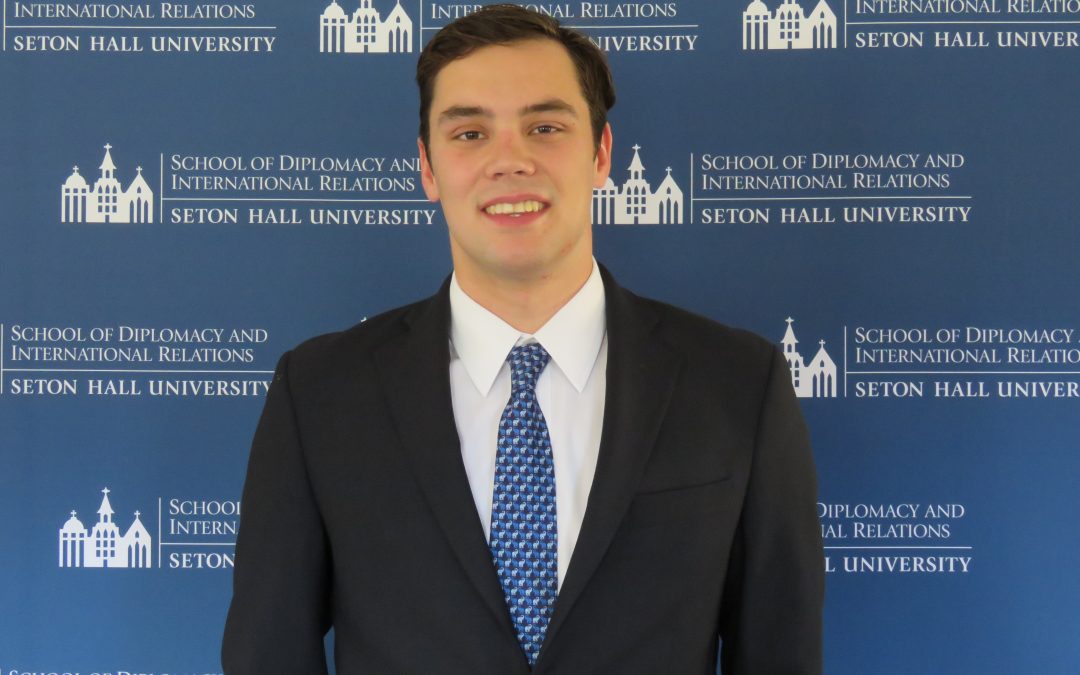
by Madison McHugh | Oct 18, 2017 | Internship Experiences, Undergraduate Students
My name is William Smith, and I am studying Diplomacy and International Relations at Seton Hall. Over the summer, I had the opportunity to intern with Waterfront Development Corporation Limited, a crown corporation tasked with ensuring the prosperity of waterfront areas in my home province of Nova Scotia, Canada. Waterfront areas are extremely important to the coastal area of Nova Scotia, making their prosperity crucial to the success of the province’s tourism industry.
My responsibilities related primarily to the promotion and execution of the corporation’s major summer event, the 2017 RDV Tall Ships Regatta. The regatta is a 7,000-nautical-mile sailing race in which spectacular vessels, known as tall ships, make their way from country to country over the course of the summer. The regatta makes 10 stops in different ports across the province, representing major tourism opportunities for the host ports. The race is heavily promoted as a spectator event as the ships themselves are attractions in their own right. However, there are opportunities to actually sail aboard the majority of the ships visiting as well.
Due to the lack of publicity, I was specifically tasked with creating interest in the sailing opportunities in order to make the event successful as an experiential one as well as a spectating one. To meet the expectations of my tasks, I collaborated with television and newspaper professionals in order to promote the events and sailing opportunities to the general public. I also interacted with some of the crew members of the ships that appear in the regatta who provided me with more information to better promote the experiences that exist. I realized that while television and newspaper promotional activities were beneficial in increasing awareness for the general public, in order to be most effective, I also needed to identify and contact target groups, a task that took up much of my time over the summer.
The opportunity to assist in promoting my home province’s attractions, particularly through a large international event like the Tall Ships Regatta, was extremely rewarding as I recognized the value of bringing the event to fruition for the sake of the province’s success and gained valuable event-planning and management experience.
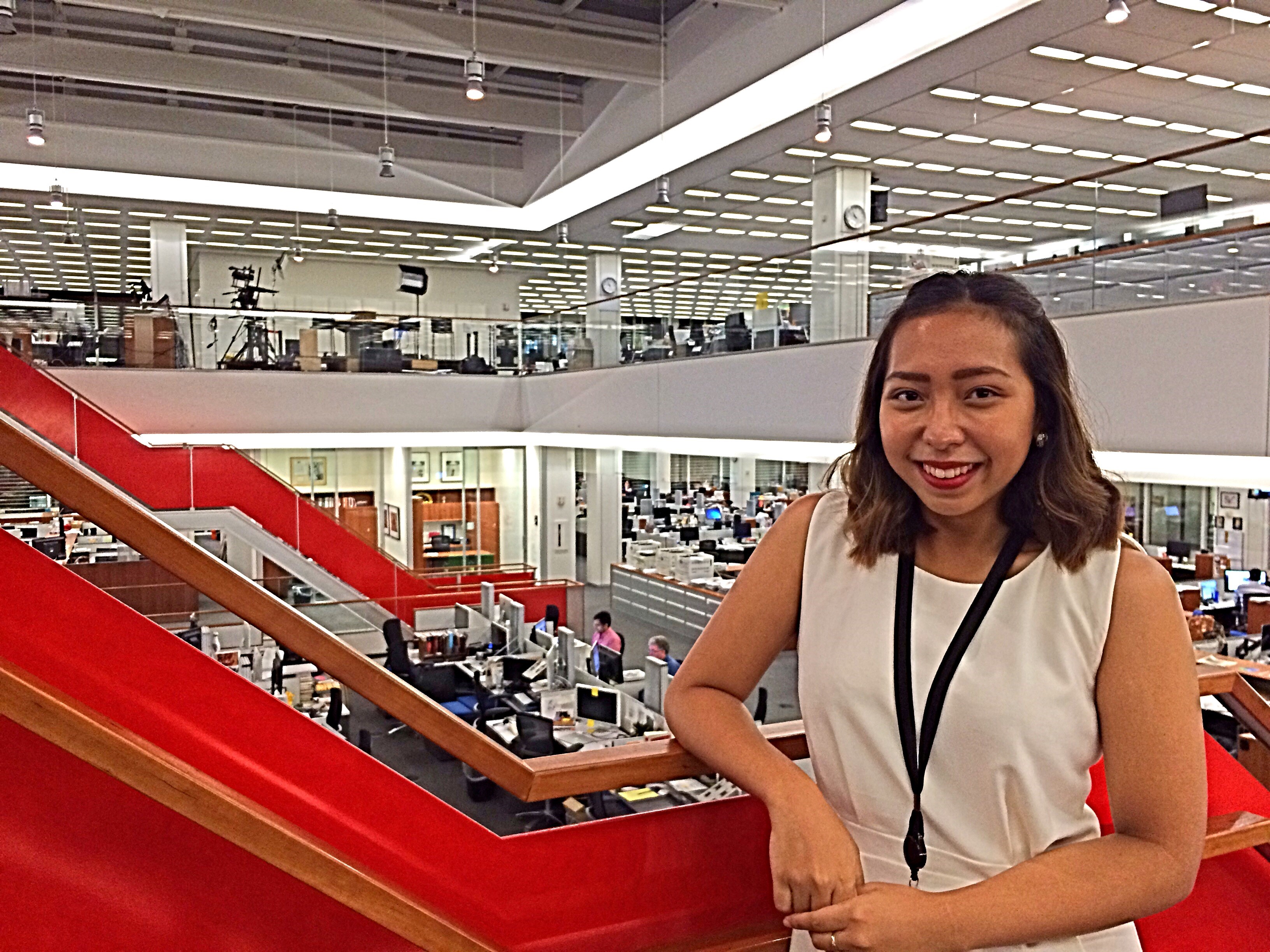
by Catherine Ruby | Aug 18, 2016 | Internship Experiences, Undergraduate Students
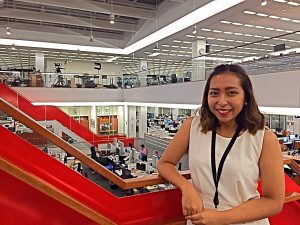
After Deadline – My Summer at The New York Times
I started my internship at The New York Times on the day of the Orlando attacks, the worst mass shooting in United States history.
Or maybe this thrilling summer began in May, when I spent a week at Temple University with 12 other lucky souls in what was, basically, editing boot camp – seven days that began with a wakeup call at 6 a.m. and ended after falling asleep on my books well past 1 a.m.
Let’s go even further and say the adventure started in December, two weeks before finals, when I got a phone call from a kindly old man who told me out of the blue that he would see me in Philadelphia. Confused, I asked, “Excuse me, what is this for?” And Professor Edward Trayes said, “Oh, The New York Times is looking to pay you $1000 a week to be an editing intern – does that sound good?”*
But this story really kicked off when I spent the entire month of October reviewing for the Dow Jones News Fund copy editing test – a tear-inducing, confidence-busting exam that around 1000 applicants subject themselves to every year, just for a shot at the world’s greatest bastion of journalism.
I thought I’d flunked the test, which made the call from Dr. Trayes all the more surprising. At that point, I would have been happy to be assigned to any desk at the Times, but Dr. Trayes thought I would be a good fit for the Foreign/National desk – or, paradise for an international relations major observing her first U.S. election.
Foreign/National was inundated by so much bad news this summer (multiple bombings, multiple shootings, multiple email scandals from the Democrats, multiple gaffes from Donald Trump) that one of the staff editors, a former Dow Jones intern, said, “Francesca, this is the no-joke desk. You should be proud of yourself for surviving this summer.”
Honestly, I’m just relieved I survived the hours: I worked on Saturdays from 9:30 a.m. to 4:30 p.m., then on Sundays to Wednesdays from 4 p.m. to 11 p.m.
A lot of things copy editors do are easier said than done – for example, writing a headline that is punchy and attention-grabbing and an accurate summary of the story while staying true to the lofty Timesian tone and fitting into the allotted layout perfectly is an art form.
The challenge for us interns was to make it on “After Deadline” – a weekly list on the Times’s internal blog that recognizes the past week’s best headlines. Only one out of nine ever made it (spoiler alert: it wasn’t me). Getting my first headline through to print had been hard enough, but it finally happened on a story about Hillary Clinton and Elizabeth Warren. My proudest achievement, though, was on the first night on the Democratic convention: I wrote the headline for a story about Michelle Obama’s relationship with Hillary Clinton, and for a few hours that night, it was the first hit on Google if you searched “Michelle Obama.”
There are many things that people don’t realize about newspapers. The locations you see at the top of the article? Those are called datelines, and they indicate that the reporter was actually on the ground. But that doesn’t mean real journalism is putting on a helmet and running around a war zone with a GoPro. Some budding news websites like to put reporters in the center of the story, producing content such as “Here’s What Happened When I Had Dinner with a Taliban Leader,” or something like that. The New York Times is the only legacy newspaper that still maintains an extensive international staff in bureaus throughout the world, and reporters are assigned to a region for extended periods, not just for one-day trips.
The highlight of my internship with the New York Times was when I met Azam Ahmed, the bureau chief formerly in Kabul and now in Mexico City. I was excited not only because he was a foreign correspondent, but also because he had written the article on Taliban justice that inspired my thesis. Talking to him made me want to be a foreign correspondent all the more. You could read every academic paper about Afghanistan, but an ivory tower academic will never be able to tell you about Afghanistan the way a journalist on the ground can.
Of course, it’s going to be a while before I’m anywhere close to being worthy of Azam’s credentials.
But this summer at The New York Times was an important stepping stone, and I am grateful to have experienced how a world-renowned newsroom with the highest standards works. Now it falls on me to build my street cred as a journalist and, hopefully, work my way back to the august institution on Eighth Avenue.
*I kid you not – this was how the conversation actually went.
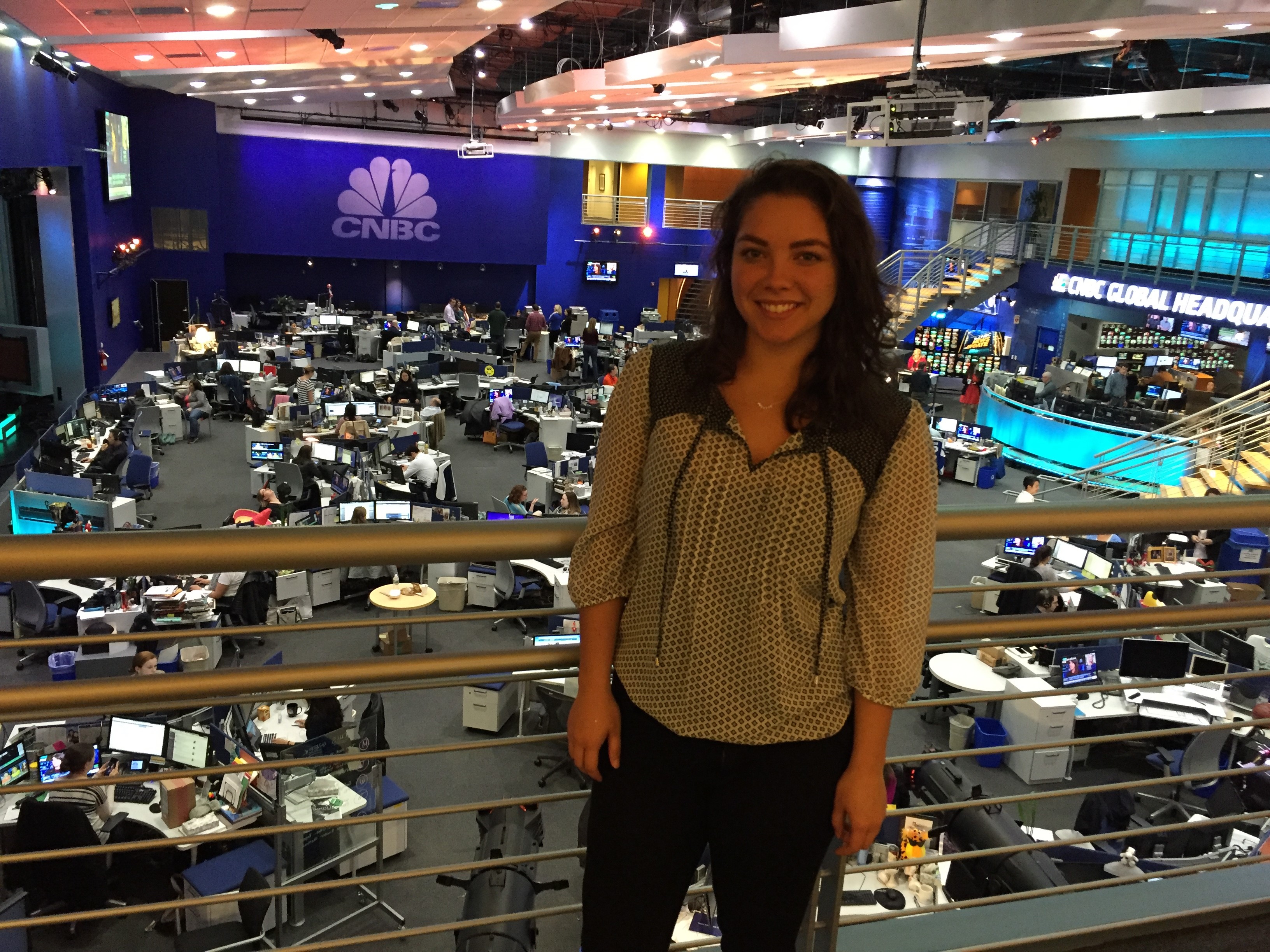
by Carolin Braxenthaler | May 5, 2016 | Internship Experiences, Undergraduate Students
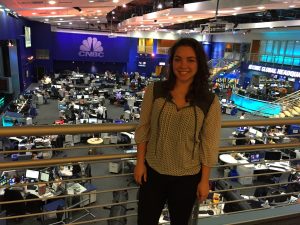
My name is Emily Balan, I will graduate in May 2016 with a degree in international relations and diplomacy, a degree in philosophy, and with minors in French and journalism. After exploring the non-profit sector last year for my first internship (I was the communications intern at the human rights advocacy NGO Human Rights First), I decided I wanted to explore the realm of the newsroom. In my last semester, I am a digital breaking news desk intern at CNBC, the financial news network.
At CNBC in Englewood Cliffs, N.J., I am treated as a news associate, which is like an entry-level job for a journalist. I attend the morning and afternoon briefings where all the departments and section editors brief the managing editor on what they’re working on for the day and other long term projects. I am mainly responsible for producing content for the website. This means grabbing wire stories that are relevant to our readers’ interests. It also means doing some reporting and writing up small stories to publish on the website.
I work closely with the digital team, helping with formatting, as well as with research for projects. I am working with my on-site internship supervisor and another editor, who handles most of the international stories, in order to produce my own story. I had visited the Czech Republic immediately before starting my internship, so I collaborated with these editors to pitch a story that I have been researching in my spare time at CNBC.
I have been able to develop close working relationships with my fellow interns as well as news associates since we are all working in an open air space. The news room, without the myriad blocks of desks and cool lighting with a studio built in, could look like a large warehouse in terms of open space and lack of architectural design. The open air, however, makes it more conducive for editors to communicate quickly and directly when breaking news comes in.
The newsroom can definitely be an exciting, albeit intimidating, place. On my second day, the Fed made a major decision and I jumped right in to feed quotes from an on-air guest to the editor writing up the story for the website. On most days, I merely bear witness to the excitement since intern-liability is too great for a network whose majority viewership is in the financial sector. I find that I am learning how to keep up with such a fast-paced environment, as well as instilling the journalistic values of accuracy and timeliness.
I am learning more than I ever thought I would know about the financial world, both in the United States and around the world. I am thankful that I saved the two classes – International Political Economy and Economic Aspects of the International System – for my last semester because they were a great starting point that gave me a framework to think about the global financial news. Right now, the big story is on oil: it is the main export of many fiscally powerful countries (think OPEC) and the low prices impact international relations. There have been several meetings of world powers to coordinate efforts to stabilize the global economy in light of a strengthening dollar combined with low oil prices.
The most challenging aspect of the job, however, is precisely that I do not know the business behind these stories. I am not familiar with how the stock market works, although I study for pop quizzes on current topics from the managing editor during our twice-daily briefings. It is also challenging to be in such a tense environment where anything could happen at any time. I find myself intimidated by these busy and important people, whose work affects so many others. I found that I have to purposefully instill myself with the confidence necessary to talk about my projects and pitch stories on a weekly basis.
There is some respite in the chaos of the newsroom. Since I am more available than some of the other interns, I work for the commentary section, mainly copy editing articles and contemplating them (adding links and writing headlines and descriptions) to be published at the peak of their news timeliness. This is a more laid back environment, separated from the constant stream of news from before the market opens to after the closing bell.
I would definitely recommend this internship. My supervisors and everyone involved in the internship process have been more than welcoming and accommodating. I would say, however, to make sure that you have a thick skin and that you have an interest in the financial aspect of things, even if it is just to learn more about the subject. It is tough to report on a subject you know very little about, but the learning experience and the newsroom environment is more than enough to make up for the intimidating pressure.
by Catherine Ruby | Apr 8, 2013 | Internship Experiences, Undergraduate Students
 An undergraduate student at the Whitehead School of Diplomacy and International Relations with a minor in Asian studies, Areej Elahi Siddiqui is a current student intern with PolicyMic, an online media platform. Her articles have been features on their website and most recently on a popular blogger’s site, Michelle Malkin, who has almost half a million followers on Twitter.
An undergraduate student at the Whitehead School of Diplomacy and International Relations with a minor in Asian studies, Areej Elahi Siddiqui is a current student intern with PolicyMic, an online media platform. Her articles have been features on their website and most recently on a popular blogger’s site, Michelle Malkin, who has almost half a million followers on Twitter.
When she’s not writing articles for PolicyMic, you can find her slumped in a chair at her local coffee shop writing either YA fiction or articles for her university newspaper, the Whitehead Envoy.










